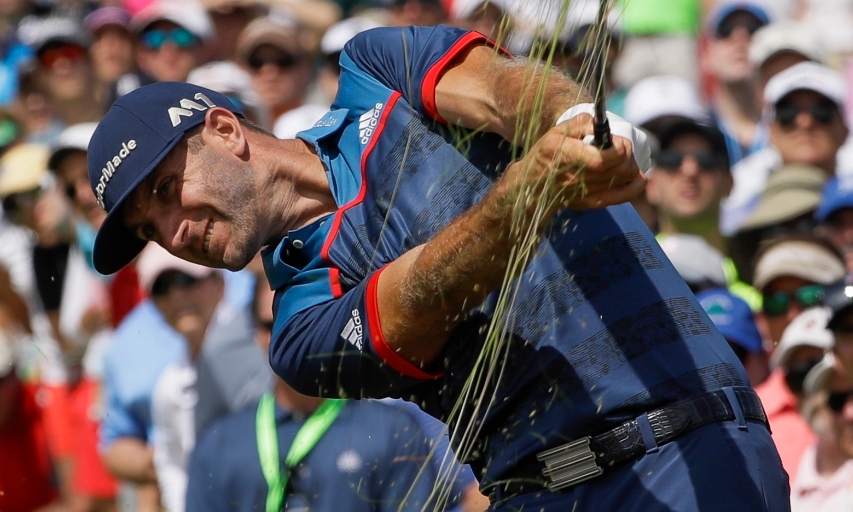Dustin Johnson Already 10 Behind In U.S. Open Title Defense
- Details
- Category: Inside Golf
- Published: 2017-06-16

Dustin Johnson Hits Out Of The Fescue On The 17th Hole During The First Round Of The U.S. Open. (AP Photo/David J. Phillip)
ERIN, Wisconsin (Doug Ferguson/AP) — Dustin Johnson stood on the back of the ninth green at Erin Hills and stared at a leaderboard filled with red numbers under par.
His name was to the right with a black number — 3-over par.
And then the defending U.S. Open champion missed a 10-foot birdie putt to cap a most forgettable 75 that included one birdie, three three-putts and six shots out of the knee-high fescue that frame the generous fairways of Erin Hills.
"You won't get a better day for scoring," Johnson said during the long walk to the scoring area, knowing he had wasted a prime chance in his bid to become the first back-to-back U.S. Open champion in 28 years.
Just not for him.
For all the time he spent in the hay, Johnson was most irritated with his putter.
"I didn't hit it great," he said. "But I hit it good enough to shoot a good score."
It was the highest opening round by a defending U.S. Open champion since Rory McIlroy shot 77 at Olympic Club and missed the cut. Johnson might be headed home early for the second straight week until he can turn it around.
That means making putts.
And it means spending more time in the fairway.
The most damaging hole was early in his round when Johnson hit iron off the tee on the par-5 14th, only to lay up in grass so thick that a marshal marked it with a tiny flag, and then it was hard to find the flag. Johnson gouged it out, and the ball climbed the collar of a bunker and nestled in more thick grass. He chopped that one out above the ridge of the green and three-putted for double bogey.
With an iron on the short par-4 16th, Johnson missed another fairway into the hay and did well to get it to back of the green, only to three-putt that for a bogey. After his lone birdie, another tee shot went into the fescue left of the fairway, and he had to two-putt from 55 feet just to escape with bogey on No. 17.
That was his last bogey.
He just didn't make any birdies.
"I'm a little frustrated that I shot 3 over," Johnson said. "I didn't play that bad. I just didn't putt very good. It wasn't that I was hitting bad putts. My speed was a little off. I'd either hit it just high and lip it out or they went across the front edge of the hole."
Johnson wasn't the only one to struggle in his group.
Jordan Spieth also made only one birdie, giving the last two U.S. Open champions a total of two birdies between them on a day when Rickie Fowler opened with a 65 and seven other players broke 70 from the morning wave when the wind was manageable.
Spieth had no stress in his round, hitting every fairway and every green on the back nine and putting for birdie through the opening 12 holes. He finally dropped a shot with a strong chip and a missed par putt on No. 4, and then got it trouble in the thick stuff on the next hole.
Spieth first went with an 8-iron. He hammered it as hard as he could and looked up toward the sky to see where it went. His caddie, Michael Greller, pointed toward the rough a few feet in front of him. This time, Spieth took a lob wedge and hit that as hard as he could to the collar of rough on the left side of the fairway.
He hit that to 5 feet and was happy to make bogey.
Just like Johnson, he had his chances. Just like Johnson, he rarely made them.
And just like Johnson, he couldn't ignore the leaderboard. Spieth shot a 73 and was eight shots behind.
"Neither one of us could make a putt," Spieth said. "I've played a lot of golf with him and have seen him at his best. And everybody has off days one way or another."



